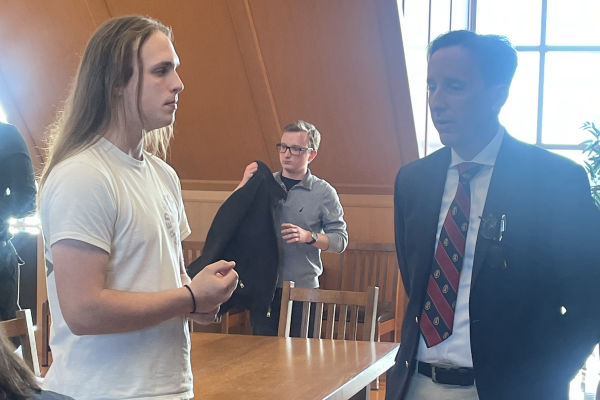Connecting Classrooms to Congress
About Connecting Classrooms to Congress
Connecting Classrooms to Congress is a collaboration of faculty in political scientists and education at IDEA, Columbia University, and the University of California Riverside and high schools in Ohio, Illinois, Florida, Washington, and California. The project developed and tested a web-based platform that enables high school students to study a pressing political issue and then discuss that issue with their Member of Congress in a Deliberative Town Hall. After completing the curriculum and participating in the DTH, students reflect on that event through analytical writing and continue the conversation within their classes and the broader community. The project is entering the fourth year of a grant funded by the Institute of Education Sciences (IES).
Impact
Collaboration with Members of Congress
Congressional offices are impressed and supportive of engaging with high school students and issues through this research. To date, we have held Deliberative Town halls with nine Members of Congress:
Representative Aaron Bean (FL 4th District)
Representative Barbara Lee (CA 12th District)
Representative Brad Schneider (IL 10th District)
Representative Danny Davis (IL 7th District)
Representative Derek Kilmer (WA 6th District)
Representative Jesús García (IL 4th District)
Representative Lauren Underwood (IL 14th District)
Representative Marcy Kaptur (OH 9th District)
Representative Mark Takano (CA 29th District)
Curriculum Development
Based on teacher and student feedback and analysis of data from Year One, the Connecting Classrooms to Congress team updated the curriculum to match the project's, teachers, and students' needs. The curriculum has several components: lesson plans; student materials including an issue guide; Prytaneum, the platform on which the deliberative town hall takes place; and a final writing assignment. The lesson plans are organized into 4 parts:
Introducing the Project: Representation, Deliberation, and Democracy (3-4 days)
Exploring the Issue (3-5 days)
Deliberating the Issue (5-6 days)
Civic Writing (2 days)
The team has also developed 3 issues guides that schools are able to choose between:
Climate Choices: How should we meet the challenges of a warming planet?
Work and Pay: What should be done to ensure all workers can earn enough to support themselves?
Social Media: Should the federal government have a role in deciding what speech is acceptable/ unacceptable on social media?
Platform Development
The TeCD-Lab at UCR has continued to improve Prytaneum, which is the online town hall platform designed to give participants more robust opportunities to engage with elected officials on substantive issues. A new change made to the platform in Year 2 enables the Member of Congress to generate a poll in real time during the Town Hall. In responding to the poll, students can indicate their views on a policy issue by sharing whether they are “for,” “against” or are “conflicted” on the policy question. In addition, students can type into a textbox and provide their reasons for their position. At the poll's end, the moderator shares a visualization of the results back to the students so they can see how their peers think about the issue too.

Moving Forward
In Year 4, we plan to conduct a rigorous research study looking at the impact of the curriculum by measuring students’ gains in analytical knowledge, written communication, and integrative complexity. We will also analyze student writing using the Civically Engaged Writing Analysis Continuum. Finally, we will continue to explore teachers’ and students’ experiences of the curriculum via classroom observations, focus groups, and interviews to help us understand how to integrate and scale such an initiative in future years.
For more information, please visit our project website.
Funding
Connecting Classrooms to Congress is funded by the Institute of Education Sciences (IES). Through its generous award of $2 million the project is expanding deliberative democratic principles to high school students across the country, and shaping positive, collaborative connections with government for the next generation of voters.
